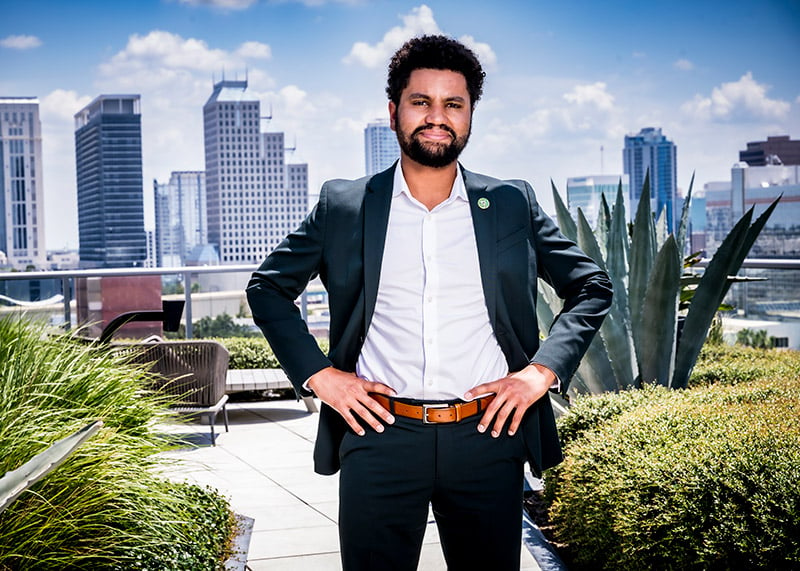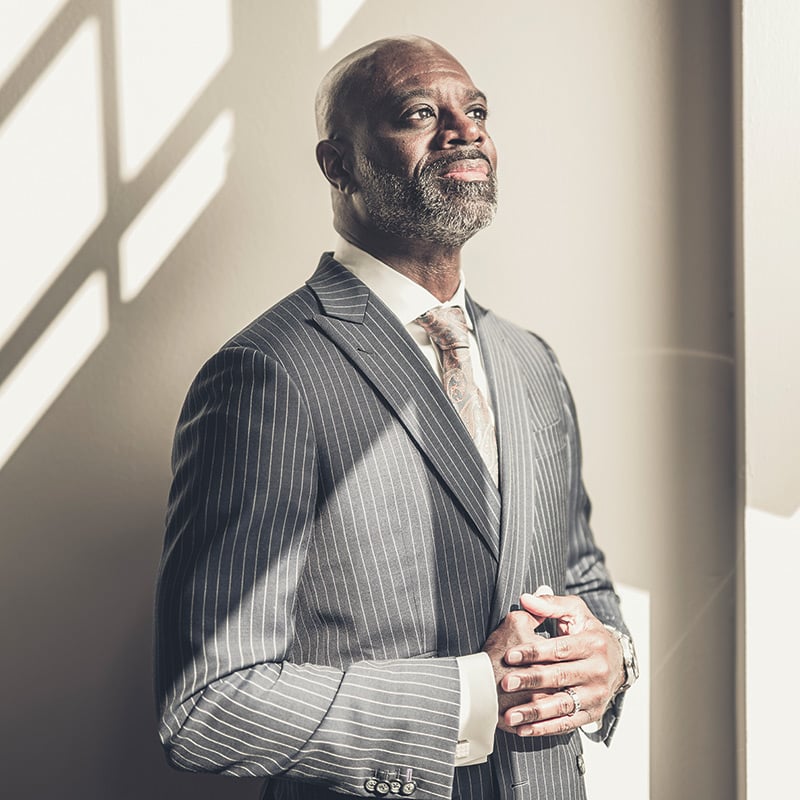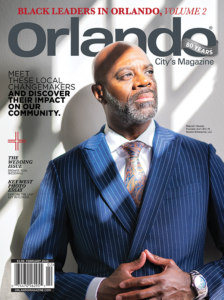How Orlando’s Film Community Is Thriving
Orlando is a burgeoning community for student films, indie productions, TV shows and much more.

Students from UCF’s screenwriting program were finalists in the 2025 Coca-Cola™ Refreshing Films competition. ©Kyle Hanson
We are all exposed to a mind-boggling amount of digital content every day, from streaming videos on the Internet to services on our smart TVs to what we see on the big screen when we go to a movie. Keep an eye out for The City Beautiful, as more and more of that content is being produced in Orlando each year, from a diverse mix of student and professional talent.
“There’s a strong independent spirit here, alongside a growing infrastructure that supports everything from grassroots projects to large-scale productions,” says Jennifer A. Marcial Ocasio, director of communications for the Orlando Economic Partnership (OEP). “What truly sets Orlando apart is the sense of community—filmmakers at all levels can find support, resources and connection.”
A key part of that support comes from the Orlando Film Commission (OFC), a program of the OEP.
“As a central hub for production needs, the commission acts as a one-stop-shop for permits, resources and guidance throughout the entire filmmaking process,” she adds. “We serve as a liaison between productions and local municipalities, helping to streamline logistics so creatives can focus on telling their stories.”
In the last fiscal year (2023–2024), the OFC issued 174 permits, supporting 317 permitted production days on public property. The number, however, doesn’t reflect the productions who film on private property, and thus do not need a permit.
“While these figures give a strong snapshot, actual production activity across the region is significantly higher,” says Ocasio, “demonstrating the steady demand and creative momentum in Orlando’s film community.”
According to Ocasio, Orlando hosts a wide range of projects, including indie films, commercials, reality TV, documentaries, music videos, student films and corporate content. The versatility of the region makes it attractive for many different types of productions.
A Collegial Atmosphere
Lorraine Sovern has been a longtime member of Orlando’s film community. She was chosen as a 2024 Orlando magazine Woman of the Year for her work as a film festival curator and encouraging those in the industry to let their voices be heard.
“I truly believe that films can change the world,” says Sovern. “Film is a miraculously effective tool for building empathy through examining stories untold.”
Sovern recently completed her Master of Fine Arts at the University of Central Florida and made multiple films while in that program. She’s currently on the festival circuit with one of those films, “Shotgun Baby,” which recently had its premiere at the George Lindsey Film Festival at the University of North Alabama.
Taking part in film festivals, she says, is integral to the student filmmaking experience.

Lorraine Sovern, a recent graduate of UCF’s Master of Fine Arts program, on the film-festival circuit with her film “Shotgun Baby,” which she made at UCF.
“It’s a low-stakes way of putting yourself out there,” says Sovern. “It can be really hard for a lot of us, especially if we are the introvert type, to actually have to get up and talk about our work. Yet so much is demanded of you when you get to a point of success—at that point in your career, you need to be able to speak eloquently.”
Sovern’s previous film, “Forward Fast,” won Best Short Film at the 2023 Tallahassee Film Festival, Best Documentary at the LA Underground Film Festival and Best Micro Short at the Atlanta Underground Film Festival.
And Sovern’s not the only former UCF student who’s made a name for herself on the film festival circuit. UCF’s film students have regularly received accolades in film festivals and student-film competitions, says Dr. Lisa Mills, a professor of film and associate director of the Nicholson School of Communication and Media at UCF. For the second year in a row, students in award-winning documentarian Betsy Kalin’s classes alone (Sovern’s mentor) are finalists in the documentary category for the Palm Beach Student Showcase of Films.
It was that mentorship that led Sovern to UCF.
“I went to undergrad there and I was just blown away by the passion of the professors,” she says. “One of the biggest things, and this inspired me when I was in the same role and teaching undergrads, is the level of respect between professors and students. There was this awareness and humbleness that I think may be unique to film where we’re all always creating. We’re all in a creative process together, and so even when you’re in a class where you’re workshopping something, we’re all learning from each other, including the professors.”
“I think that was just a level of equality that I wasn’t used to,” she adds. “It really helped me thrive, and feel like I could take more risks.”
UCF has also been submitting to the Coca-Cola™ Refreshing Films Competition for the past three years. Last year, screenwriting students from UCF placed in the semi-finals; this year, students placed in the finals.
Mills credits UCF’s awareness of film competitions and festivals to new faculty bringing new ideas to the classroom.
“Our faculty have top academic credentials, and they have the professional street cred,” says Mills. “Our faculty has it all. We’ve been getting a lot of great hires, like Bruce Wood, who brought the Refreshing Film Competition to the table.”
Mills estimates that between the films coming out of UCF’s Bachelor of Fine Arts and Master of Fine Arts programs, 200 films are produced each year.
“That’s a lot of opportunity for students,” she says.
Another powerhouse film school in Orlando, Full Sail University, recognized as the 2022-2023 “School of the Year” by the Florida Association of Postsecondary Schools and Colleges. Earlier this year, it celebrated its 22ⁿd year as the primary sponsor of the Florida Film Festival.
Editor’s Note: Just before our press deadline, it was announced that “The Sky Was on Fire: Ballet and War in Ukraine” was the Florida Film Festival’s Audience Award Winner. The film was created by a local team from Adrenaline Films.
Full Sail was also celebrated at the 97th Annual Academy Awards in March 2025. 47 alumni were credited on 18 nominated projects across 21 categories, including two graduates individually nominated for their work in the Sound category: Gary A. Rizzo (1993) was nominated for his work on “The Wild Robot” as re-recording Mixer, as well as Nancy Nugent (1999), nominated for her work on “Wicked” as supervising sound editor.
It reinforces Orlando’s status as a supportive and creative film community, says Anne Russell, program director, film production at Full Sail University.
“Central Florida is home to a dynamic and resilient film community that thrives on a strong foundation of film education, a diverse pool of talented professionals and ideal shooting conditions year-round,” says Russell. “It supports artists through its robust educational programs, such as those at Full Sail University, which provide hands-on training and industry connections.”

Alum Larry Katz is a Full Sail University Hall of Fame graduate and a film lab instructor at the university. Courtesy Full Sail University.
Larry Katz, a 2000 Full Sail University Hall of Fame graduate, is now an instructor at Full Sail.
“I came to Full Sail in 1999,” says Katz. “It was only a one-year associate in arts (AA) program at that time. I felt supported being surrounded by people who understood my goals. The most important thing I learned was to be a lifelong learner—whether on set or on location.”
“After I was inducted into the Full Sail University Hall of Fame in 2014,” Katz continues, “it dawned on me that I got to live out my dreams. That maybe now I could help other people live out their dreams. So, I left Hollywood to move to Orlando and I have been an instructor at Full Sail University since 2014. It has been the most fulfilling thing in my life to be able to help our students start their own careers. Now, some of the grads have worked on bigger and more exciting projects than I ever worked on.”
Florida’s Filming Incentives
While Florida currently doesn’t offer a statewide incentive, says Ocasio, the Orlando region offers competitive benefits like streamlined permitting, cost-effective locations, a skilled local crew base and access to a variety of natural and built environments within a short distance.
“Most productions take advantage of Orlando’s diverse on-location options,” she says.
Mills, who is helping to develop an Orange County film production incentive, sits on the Orange County Commission’s working group to develop that incentive. She says film production across Florida ebbs and flows with the politics of the state.
“You’d have to characterize this as an ebb since we don’t have a statewide film production tax incentive or rebate program, but multiple municipalities in the state of Florida are stepping up,” says Mills. “With a solid patchwork of incentives, they’re bringing filmmakers into their communities to make films, and, so far, it’s working. I can only see that growing from here.”
The group looked at incentives that were successful in municipalities such as Miami-Dade and Tampa-St. Petersburg and examined the different ways those incentives are operated and funded before bringing their findings before the commission.
“They seemed very enthusiastic about it,” says Mills.
The ball is now in the commission’s court as it examines funding possibilities with its staff.
The ABCs of Independent Filmmaking
ne native Orlandoan making a splash on the independent film scene is Rich Ronat, who released his latest film, “Culprit” via streaming services in February 2025. He co-founded Good Rebel Pictures with the intent of delivering captivating stories with narratives that find the balance between commerce and creativity.
“I think so many stories are formulaic and boring, and the only way to avoid that is to find fresh, new stories, to do it independently” says Ronat. “’The Brutalist’ is a great example. He (Brady Corbet) made that film for $10 million and made it in VistaVision. It’s so cool he pulled it off.”
Ronat points to another 2025 Oscar winner, Best Picture “Anora,” as an example of what can be done on a smaller budget. “Anora” was filmed for $6 million.
Working on an independent with a smaller budget means you have to use your creativity to find solutions, says Ronat.
“You’re basically using your resources to the utmost,” he says. “On ‘Culprit,’ I had a crew of six people and very little money, so we had to be as creative as we could, for example, when your lighting guy is also doing your slate and your prop department is also your art department.”
It’s also important, say Ronat, to create a vehicle for yourself, whether you want to act, write, direct or produce.
“If you’re acting, find yourself a writer or collaborate with a writer to find a lead role that’s fantastic for you,” he says. “If you want to be a better writer, direct. If you want to be a better director, produce. If you want to be a better producer, write.”
Also, because of the streaming services, it’s easier to get a film made these days, he adds.
“I think the good news is that because of the streaming platforms, it’s all gotten pretty dispersed (distribution), so you can make anything to some degree within a certain budget,” says Ronat. “But you need a little bit of capital and have to partner with the right companies.”




